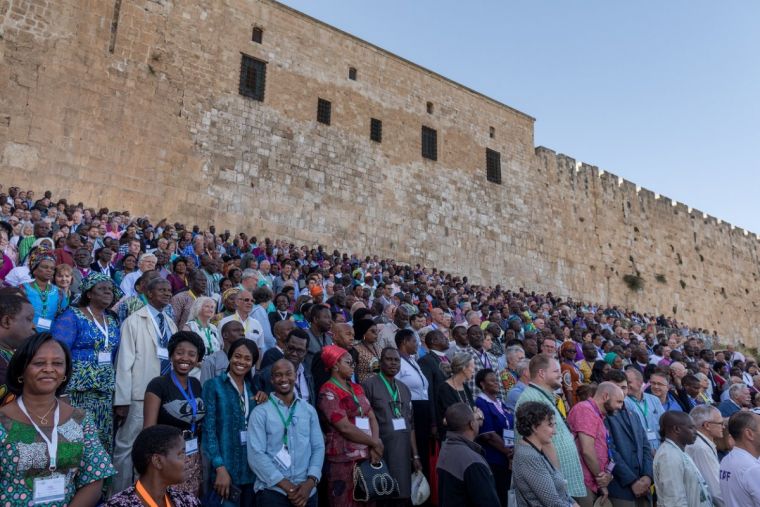The mysterious case of the Anglican Primates, Gafcon and Justin Welby

There is a curious resemblance between the recently-completed meeting of Anglican Primates in Jordan and the hit TV show The Masked Singer.
In both cases, you see the pictures and get some words – but are left scratching your head as to what lies underneath. Perhaps best, though, not to start comparing the attire... Of course, let's get real: the gathering of Anglican leaders in Amman has rather more serious ramifications than last week's unveiling of Masked Singer contestant 'Tree' as England star soccer player Teddy Sheringham in the UK's most recent episode.
Primates from 33 of the 40 Anglican provinces were at their meeting. Four of those gaps would have been filled but for vacancy, illness or other unspecified difficulty in getting there. Three Primates from some of the largest provinces – Nigeria, Rwanda, and Uganda – chose not to attend. That trio are Gafcon archbishops and oppose the liberal trends within Anglicanism. However, some Gafcon Primates were there. One of them, the Primate of South Sudan, Justin Badi, intriguingly described the meeting as 'refreshing and very encouraging', and said it was 'held in a mature way'.
I understand that the communique issued at the end of the meeting had opportunity for input from all the primates, and that press officers and communications staff were not involved in its drafting. So it must be taken as representing the views of at least the majority of those present. Given this is the case, all sorts of genuine questions flow both from that statement and the fact of Gafcon's representation.
1. What is Gafcon's game plan in this?
In 2018, a Gafcon 'Letter to the Churches' was adopted without dissent at its mass gathering in Jerusalem. It urged Gafcon members (presumably including bishops) to decline invitations to the Lambeth 2020 Anglican conference this summer and 'all other meetings of the Instruments of Communion' – unless certain conditions were met.
Given that those conditions have not been met, and the Primates' Meeting is one of the 'Instruments of Communion', what led some Gafcon archbishops to disregard that call and join in – while others did opt out? Either way, Justin Welby felt confident enough of a lack of opposition from Gafcon to refer to its recently-formed new provinces (for example, New Zealand) as 'negative aspects' at a press conference afterwards and to make clear they weren't even discussed.
2. Has any attempt to sanction the US Episcopal Church been abandoned?
In 2016, Primates voted overwhelming to apply disciplinary measures to the US Episcopal Church after it officially sanctioned same-sex marriage. The precise out-working – or not – of these measures since then has been a matter of confusion and discussion.
There is an opaque reference to the Primates at their Jordan meeting being 'acutely aware of the ongoing tensions within the Anglican Communion' according to the statement issued afterwards. But there is little if any hint of what if anything is happening in this area, which affects not only TEC but other provinces indirectly too. Apparently a task group established in 2016 to examine how Anglicans 'might walk together despite the complexities we face' has completed its work, according to the statement, and has presumably touched on this in some way. But no details are given.
3. What is the 'Day of Repentance' on 29th March?
We are told that the task group referred to above has produced 'prayers of repentance' to be used in Anglican churches on March 29th this year – but no details are given. Is this repentance over immorality? Child abuse? Disunity? Issuing mystifying communiques? Or what?
4. Is discussion about issues of morality now regarded as 'inward-looking'?
According to Justin Welby at the post-meeting press conference, he hopes that this summer's Lambeth Conference will 'draw a line under some of the inward-looking approach of the past'. Many have taken this as referring to past bust-ups over issues surrounding sexuality. But what does he mean? And what does that look like in practice? How would it even be possible?
All of this makes 2020 an even more interesting year for Anglicans. It is hard to see how the Communion's fractures can just be wished or willed away. As Martin Davie, the theologian, wrote after this Primates' Meeting: 'As in World War I, both sides in the disputes over sexuality in the Anglican Communion want peace to be restored. The problem is that, as in World War I, both sides have very different views of what peace should look like.'
Justin Welby seems to hope the war will be over by Christmas. But we all know how that hope worked out in 1914...
David Baker is a former daily newspaper journalist now working as an Anglican minister in Sussex, England. Find him on Twitter @Baker_David_A











